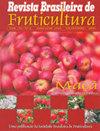The effects of different organic fertilizers and reduced doses of chemical fertilizer applications on yield and quality traits in greenhouse melon cultivation
IF 0.9
4区 农林科学
Q4 HORTICULTURE
引用次数: 0
Abstract
Abstract As a result of excessive use of chemical fertilizers in greenhouses, the yield and quality of the crop decreases over time. In the study carried out in two different locations; Arbuscular Mycorrhizal Fascicles (AMF), vermicompost (VC), seaweed (DY), bat manure (YG) and 30% reduced chemical fertilizer (KG) were applied. In the study, fruit length and diameter, fruit weight, fruit meat and Shell thickness, leaf fresh and dry weight, pH and total dry matter dissolved in water were measured. According to the measurements made in both greenhouses; best results in terms of fruit length, fruit diameter, fruit weight, fruit number; Taken from YG+AMF+KG application. YG+AMF+7/10 KG application, where the best efficiency was obtained in Greenhouse-A conditions, showed an increase of 44.8% compared to the control application and 10.4% compared to the KG application. YG+AMF+7/10 KG treatment, in which the best efficiency was achieved in the effect of applications on fruit weight in Greenhouse-B conditions, showed an increase of 41.3% compared to the 12.5% control application compared to the KG. In conclusion; It was determined that mycorrhizal inoculation, some organic fertilizers and 30% reduced chemical fertilizer combinations applied in melon cultivation increased the yield in both lotions more than the full dose chemical fertilizer.不同有机肥和减施量对温室甜瓜产量和品质性状的影响
由于温室过度使用化肥,作物的产量和品质会随着时间的推移而下降。在两个不同地点进行的研究中;施用丛枝菌根束(AMF)、蚯蚓堆肥(VC)、海藻(DY)、蝙蝠粪(YG)和30%减量化肥(KG)。测定了果实的长度和直径、果实重量、果实肉和壳厚度、叶片鲜重和干重、pH值和水中溶解的总干物质。根据两个温室的测量结果;在果长、果径、果重、果数方面效果最佳;取自YG+AMF+KG应用程序。在温室a条件下,YG+AMF+7/10 KG处理效率最高,比对照处理提高44.8%,比KG处理提高10.4%。在温室b条件下,YG+AMF+7/10 KG处理对果实重的影响效果最好,比对照12.5%的处理提高了41.3%。结论;结果表明,在甜瓜栽培中施用菌根接种、部分有机肥和30%减量化肥组合,两种洗剂的增产效果均优于全量化肥。
本文章由计算机程序翻译,如有差异,请以英文原文为准。
求助全文
约1分钟内获得全文
求助全文
来源期刊
CiteScore
1.50
自引率
20.00%
发文量
34
审稿时长
4-8 weeks
期刊介绍:
The Revista Brasileira de Fruticultura (RBF) publishes technical articles and scientific communications in the area of fruit crops, referring to results of original searches and unpublished papers in Portuguese, Spanish or English, and 1 or 2 reviews per edition, of invited authors.

 求助内容:
求助内容: 应助结果提醒方式:
应助结果提醒方式:


